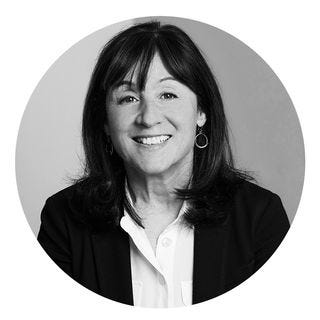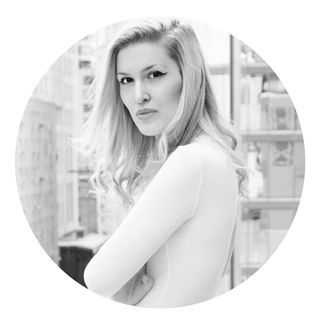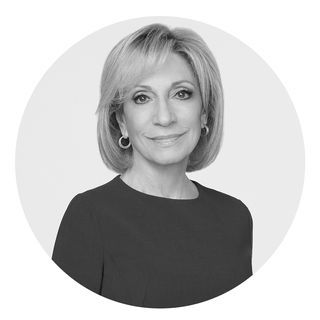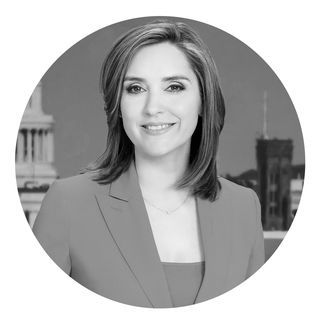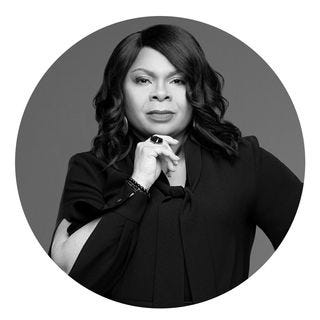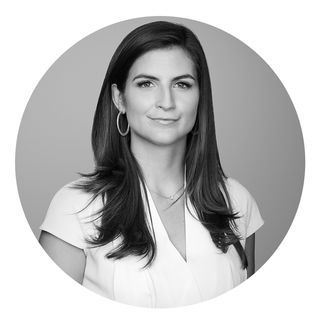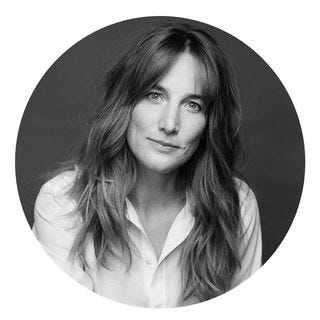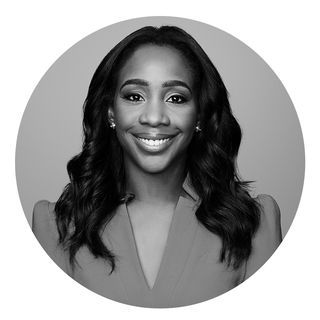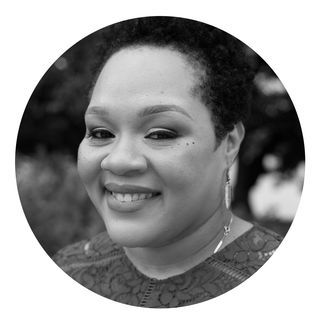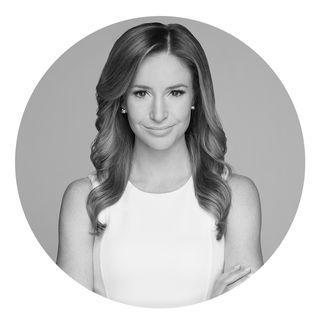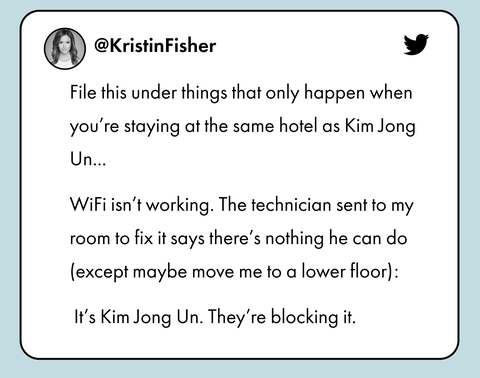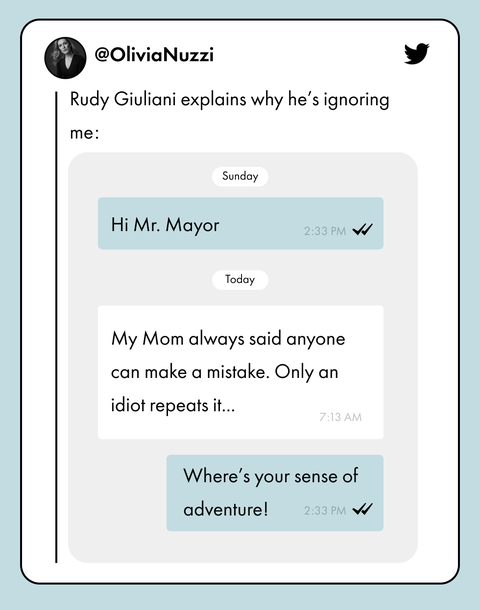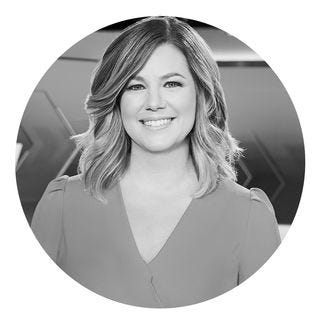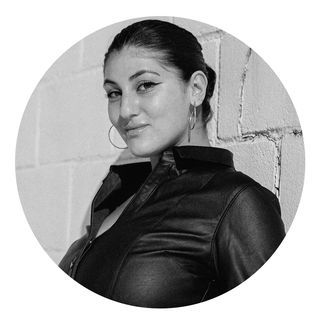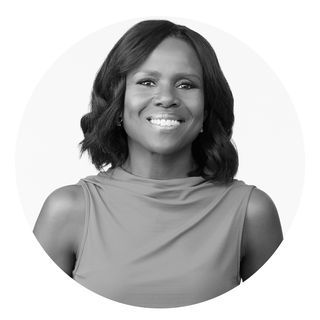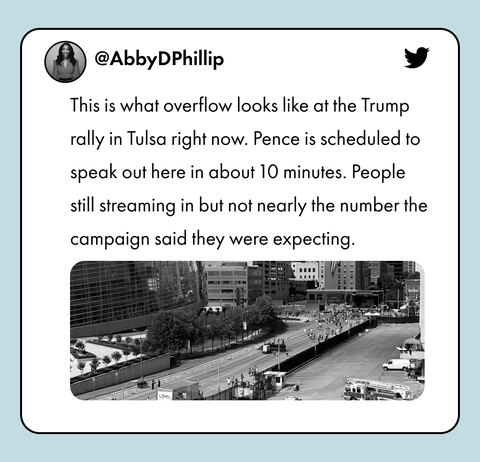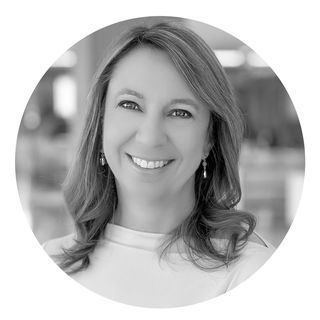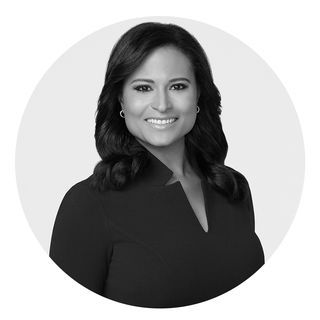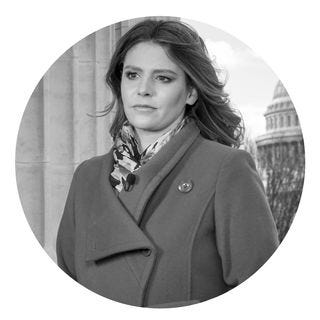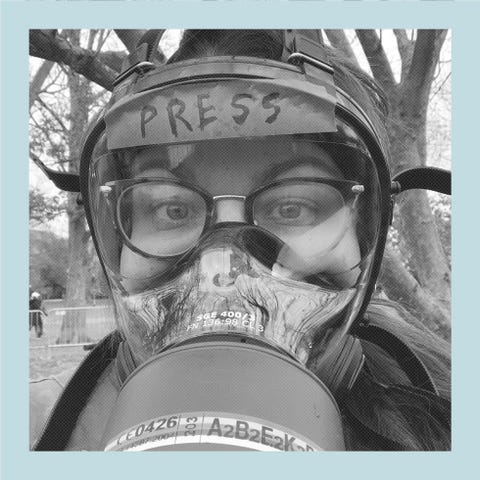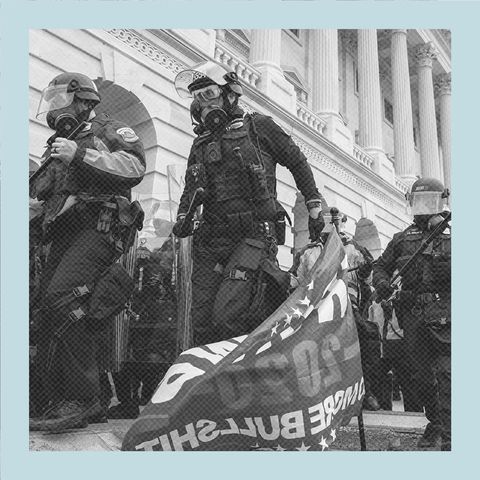Savannah Guthrie was in downward dog when it hit her: QAnon. The Today anchor was 48 hours away from her famous election
townhall-turned-grilling of President Donald Trump and trying—but failing miserably—to zen out. Questions she wanted to ask on behalf of the American public kept popping into her head. Yoga would have to wait.
“You always need to have your finger on the pulse,” says Guthrie, who earned the title “surprise badass” for giving Trump one of his toughest interviews to date. But Guthrie’s performance was just one highly-publicized instance of what she and other female journalists had been doing since 2016: Bringing truth out from under the shadow of “fake news” and into the light.
As we close the Trump chapter and open a new one—this time, with a woman in the White House—ELLE caught up with 23 female journalists who had a front row seat to the country's biggest moments, and often, unwillingly, became the story themselves.
Navigate through the years:
Every presidential election feels unprecedented, but with a matchup between two of the most polarizing candidates in U.S. history, this one really was.
Maggie Haberman, New York Times White House correspondent: I'm different than most White House reporters in the sense that I’d known Trump for a while. I’d dealt with his world for a long time. I grew up in New York. I worked at the tabloids. I had a different understanding of him. And he targeted me very early on in 2015. Is it difficult? Sure. But it was a difficulty I’d already been dealing with.
Jane Mayer, The New Yorker staff writer: My interview with Tony Schwartz, Trump’s ghostwriter, has echoed in my head for four years. He sent me an email that said, "If Donald Trump is elected president, I fear for the future of civilization." He also warned me people voting for Trump may think he cares about them, but they would find out he only cares about himself. In earlier years, a story like that would have ricocheted across the country from one end to the other. It had a big impact among readers of
The New Yorker, yes, but I had a sense we were no longer talking to the whole country. By the time
my interview with Tony ran in 2016, the country was divided in where it was getting its information. I've been at this long enough that I could feel the difference.
Olivia Nuzzi, New York Magazine Washington correspondent: I thought Trump was an interesting character, and nobody else wanted to cover him on our politics team. I met him for the first time face-to-face a couple months into the campaign. When Hope Hicks introduced me to him, she nervously blurted out, "Sir, this is Olivia. She's very young.” He looked at me and said, "Very young, very beautiful." I extended my hand to shake his, like a normal person, and he looked like he didn't know what to do. I felt like: Was he programmed wrong?
Very few thought he would actually run. Even fewer thought he could climb in the polls. Trump’s victory was “earth-shattering” for Clinton supporters, recalls Andrea Mitchell. “The end of an era.”
Andrea Mitchell, NBC News Chief Foreign Affairs correspondent & Chief Washington correspondent: I was at the Javits Center, Hillary Clinton headquarters, when sources of mine said they were concerned. It was an earth-shattering, crushing development for Clinton supporters. Even campaign chair John Podesta was crestfallen. It was clearly the end of an era, the end of their aspirations. It was a physically and emotionally draining moment for the people whom I was covering, which is always difficult as a correspondent.
Maggie Haberman, New York Times: At 11 P.M. one of my colleagues called Trump looking for his reaction to potentially winning. He said something to the effect of: "Thank you. A great honor. Tell Maggie and her little friend that no one took my Twitter away." At the time he was angry about a story my then-colleague Ashley Parker and I did about his final days on the trail, in which we referenced aides deleting Twitter off his phone. That’s where his head was that night.
Laura Bassett, freelance journalist: There was champagne, alcohol, and snacks at EMILY's List headquarters in D.C. Everyone was ready for the pinnacle of this organization: the election of the female president. Slowly throughout the night, the mood just dropped. People put down their glasses and started pacing. Around 1 A.M., it became clear Trump would win, and everyone became despondent. It was silent. It felt like a morgue in D.C. over the next few days.
In January 2017, Trump announced a blanket ban on visitors from seven Muslim-majority countries. The executive order was widely regarded as unconstitutional and its rollout unorganized, confusing even those closest to the president.
Margaret Brennan, Face the Nation moderator & CBS News Senior Foreign Affairs correspondent: I confronted Sean outside the White House briefing room and said, "Sean, we need the actual facts, here. What’s going on?" But he didn’t have an answer. Different groups within the Trump White House were clearly at odds with each other. It encapsulated the chaos within the administration. This wasn't a case of journalists not understanding or not talking to the right people. That was how the administration was functioning with different competing power structures.
Less than one month after inauguration, April Ryan asked Trump about his promise to revitalize “inner cities.” Instead of outlining a plan, Trump asked Ryan, one of the few Black reporters covering the White House, to “set up” a meeting with the Congressional Black Caucus.
April Ryan, TheGrio White House correspondent & D.C. Bureau Chief: There was a hypersensitivity about issues of race, and I wanted to hear what his message was to Black America. Trump started by complimenting me, telling me he watched and liked me. But it quickly turned. Blood rushed to my ears and head when he asked me to set up a meeting with the Congressional Black Caucus. I thought, ‘Why is he making me the story? This is not about me.’ It was embarrassing. That was pretty much the nail in the coffin for any relationship that Donald Trump and I would have. It went downhill from there, especially for minority women.
From the gilded lobby of Trump Tower, Trump delivered one of the most memorable—and infamous—comments from his time in office, telling reporters there were “very fine people on both sides” at the August 2017 white-supremacist rally in Charlottesville, VA.
Margaret Brennan, CBS News: I lived in Charlottesville. My husband proposed to me on the University of Virginia lawn. The weight of this moment landed, as it did with so many others Americans, as deeply disturbing in a personal way. If there was any chance to speak with the president, I needed to be there. At a press conference, I shouted questions at Trump, and he said, "All right, let's go,” like it was a rumble. That’s when
he said there were “very fine people on both sides.” In that moment, the president revealed what he actually thought, not what the White House told us he believed.
Trump has a rollercoaster relationship with The New York Times, and an even bumpier one with the paper’s presidential reporter, Maggie Haberman. She will never forget the day he called her “Crooked H flunkie” on Twitter. It was April 21, 2018—her daughter’s ninth birthday.
Maggie Haberman, New York Times: I woke up on a Saturday morning to a text from my colleague Mike Schmidt that said, "Don't worry about the tweets." Trump had responded on Twitter to a story I did about Michael Cohen, calling me crooked. It was my daughter's ninth birthday and we were having a party for her later that day. We also had a family member who was sick at the same time. But I have walked away from Thanksgiving dinners; another time I wrote a story on a Blackberry during a kindergarten graduation. It’s been all-consuming, important, historic, and humbling—but it's also been fatiguing, and a lot for my kids.
When Trump met with Russian President Vladimir Putin in July 2018, the head-scratching began. Trump’s admiration for Putin predates his presidency, but his controversial ties to Russia became the focus of multiple investigations and controversies.
Andrea Mitchell, NBC News: I was
interviewing the head of National Intelligence, Dan Coats, when a producer passed me a note that said the president was inviting Putin to a return summit. Here Trump was, in the middle of international outrage over the way he handled Putin, inviting him to the White House. I informed Coats live. He laughed and said, "That’s gonna be special." It turned out, my interview poisoned their relationship. Coats was forced out and replaced by sycophants who had no experience in intelligence. I've been a tough reporter covering the State Department and foreign policy, but I have tremendous respect for the sacrifice and experience that many of these agency veterans have. To see so many of them humiliated and forced to retire early has been sad. It will take our country a long time to rebuild the brain trust.
On July 25, 2018, the White House took retaliatory action against Kaitlan Collins, barring her from a Rose Garden press event for asking what Trump officials reportedly deemed an “inappropriate” question about Trump’s relationship with Vladimir Putin and Michael Cohen.
Kaitlan Collins, CNN Chief White House correspondent: They called me in and said, "You're not allowed to go to this event," even though it was open press. We got support from every outlet—Fox News, MSNBC—because everyone realized how messed up this was. It set a dangerous precedent to ban reporters whose business you don’t like. Of course, it turned out to be a big story that other White House officials thought was ridiculous. It was instructive—watch every interaction you have with an official because you don't know how they could try to use it against you.
When Dr. Christine Blasey Ford alleged in 2018 that then-Supreme Court nominee Brett Kavanaugh sexually assaulted her as a teenager, she called it her “civic duty” to speak out. Dr. Ford’s story, first reported by The Washington Post’s Emma Brown, ultimately inspired other survivors to come forward, too.
Emma Brown, The Washington Post investigative reporter & To Raise a Boy author: When we spoke, Dr. Ford did not want to go on the record. She thought she would get destroyed for coming forward and that it wouldn’t make a difference. But we stayed in touch and when reporters started showing up at her home, she decided to go on the record with me. After the story published, my email was flooded with notes from other women who had never talked about, or wrestled with, their own experiences with sexual assault. Many of them said listening to Dr. Ford unearthed powerful emotions, some they had never healed from.
One older woman told me she was assaulted as a teenager and never told anybody about it. She still carried that with her.
When I was a new reporter at the Post, I sat near a fantastic male reporter who, on the phone, was aggressive and loud. I remember thinking, "Uh oh, I'm not like that. Does that mean that I can't do this job?" But one of my strengths is that I’m not intimidating. Whenever you talk to somebody with a sensitive story, they need to feel like they can trust you. The only reason I was able to break this story is because I gained Dr. Ford’s trust.
Jane Mayer, The New Yorker: Ronan Farrow and I were accused of not having enough corroboration when
we wrote about Debbie Ramirez, Kavanaugh’s second accuser. But what we knew, and couldn't say, was there was a third case that was off the record because the witness didn't want to come forward. It was painful; journalistic ethics required that we stay mum on the subject, even while we were being attacked. I had this déjà vu feeling, because I’d covered Anita Hill’s accusations of Clarence Thomas during his confirmation hearings. In both cases, we were getting the facts to the public, but the truth didn't matter. Those Senate hearings really weren't about the truth.
Weijia Jiang, CBS News Senior White House correspondent: I
asked the president how being accused of sexual assault shaped his view of what was happening to Brett Kavanaugh. He told me to sit down several times, skating around the question. But I didn’t sit down. “Sir,” I said, “you haven't answered my question. How has this shaped your view?" It was revealing when he finally said he knew what it was like to be accused wrongly by women seeking fame and fortune. My phone was blowing up the entire time, because I was also five months pregnant and hadn't told people yet. Because of the camera angle, you could see my bump. When Trump told me to sit down, I wondered for a split second whether it was because he saw I was on my feet and pregnant.
While sniffing out a rumor that then-chief of staff John Kelly was about to be fired, Olivia Nuzzi received an unexpected invitation to the Oval Office. “What ensued amounted to a private press conference,” she wrote in October 2018, “to try to get me to change my mind.”
Olivia Nuzzi, New York Magazine: I was on no sleep and very late on my deadline. When you work on a palace intrigue story about the Trump White House, it activates nefarious actors and crazy people. You might have six sources that “independently” tell you something, but that doesn't mean anything because they're all actually insane and evil. The interview happened, and I went to smoke in Lafayette Park to unwind. I called my editor and asked, “Did I hallucinate this? Can you listen to my recording?”
I regretted in some ways how I told that story. It didn’t do a great job of conveying how powerful people in the country spend their time, in the middle of crises, talking about and trying to prevent the spread of gossip about their workplace. It's been four years of psychotic drama, at the most personal, petty level you could imagine. That is the story of why Trump failed to do anything, for the most part, that he set out to do.
In November 2018, over the span of three days, Trump attacked three Black reporters in three separate exchanges. He called Abby Phillip’s question about the Mueller investigation “stupid;” ordered April Ryan to “sit down” after asking about voter suppression; and deemed Yamiche Alcindor’s inquiry about white nationalism “racist.”
Abby Phillip, CNN Senior Political correspondent and Inside Politics Sunday anchor: These last four years have been like wading through a river of lies and misinformation. I didn’t think my question was a particularly tough one, but Trump’s response highlighted just how temperamental he can be. Yamiche Alcindor, April Ryan, and I started a group text to commiserate. We’re like, "Girl, I can't believe this happened to you," and "I hope you're doing okay." We're part of a supportive group, and we have each other's backs when it matters.
This content is imported from YouTube. You may be able to find the same content in another format, or you may be able to find more information, at their web site.
April Ryan, TheGrio: One of the things that separates the U.S. from other countries is our free and independent press—a press that is allowed to ask the president anything. So when the president tells me to be quiet and “sit down,” it’s painful. These have been some of the most demoralizing and depressing moments of my life, so emotionally difficult that at one point I needed a mental health break. Therapy has helped, and I’m able to laugh about it now. But when you're in the middle of it, where do you find solid footing? Donald Trump waged war on us journalists, when we were just trying to do our jobs.
This content is imported from YouTube. You may be able to find the same content in another format, or you may be able to find more information, at their web site.
Courtesy of Yamiche Alcindor
Yamiche Alcindor, PBS NewsHour White House correspondent: Asking the president, “Do you mean to embolden white nationalists, white supremacists?” is why I became a journalist. African-Americans have had to fight and die to be in the spaces that I now get to be in. Yes, there are online trolls that make things difficult. People get mad and write angry emails, but I'm not being lynched in the Jim Crow South. I keep that perspective, because I know I'm coming from a long legacy of people who were pushing America to live up to the ideals of treating everyone equally. I don't have time to spend hours thinking about why the president said what he said. At the end of the day, there are so many stories to be told, and I can't dwell on what he's doing.
This content is imported from YouTube. You may be able to find the same content in another format, or you may be able to find more information, at their web site.
Maggie Haberman worked on the Pulitzer Prize-winning investigation into Trump’s advisers and their connections to Russia. The president’s claims that the media peddles “fake news” didn’t deter her—in fact, it only added to the narrative.
Maggie Haberman, New York Times: He got angrier and angrier as the investigation continued, and part of what we ended up covering was his response to the investigation. After the Mueller report came out in 2019, it was good to see all these people testifying to the accuracy of our reporting under oath—especially as the president kept calling it all fake news.
It started with a handshake. Trump’s historic first meetings with Kim Jong-un were momentous for reporters, especially those who braved physical injuries to capture their time together.
Kristin Fisher, Fox News White House correspondent: We didn't know we were at the same hotel as Kim Jong-un in Vietnam. The entire elevator system got shut off anytime he moved. It was a wild trip, but ended in disappointment. So much time and energy was put in by the Trump administration before the meeting, that for both sides to walk away in a worse place than before showed that despite all of the hope Trump had, despite all his love letters to Kim Jong-un, as they are often referred to, nothing changed. And nothing has changed since.
Courtesy The Washington Post
Seung Min Kim, The Washington Post White House reporter: Then-White House press secretary Stephanie Grisham got a bruise on her arm pushing aside North Korean officials so we could rush in and capture at least part of the meeting between Kim Jong-un and President Trump at the DMZ. I got knocked on the head by a camera and accidentally stepped on an administrative official's foot, but I frantically typed out quotes from the president and through Kim Jong-un's interpreter. Every day on the Trump beat is a big moment; I jot everything down in my journal so I can tell stories to my grandkids one day. You're literally at the frontlines of history.
In November 2019, Olivia Nuzzi published her now-viral reporter’s guide to texting with Trump’s personal lawyer, Rudy Giuliani. One month later, they met up IRL.
Olivia Nuzzi, New York Magazine: My meeting with Rudy came after he sent me an email in the middle of the night to yell at me for being biased. I told him: "I try to hate everybody equally. And I never write anything about anyone that I wouldn't say to their face. Why can't we disagree about something but still talk? Isn't that the New York way? Have a nice night." After that we had brunch. He got drunk on Bloody Marys; I ordered coffee.
This has been an accessible group of people, not because they understand the value in being accessible or think they're doing the right thing, but in their incompetence, they accidentally do things that are in the public interest. Even if they lie, they're still revealing interesting or important information with the way they lie and the way they communicate.
For the first time in the 2020 election cycle—and just the third time in history—an all-female panel moderated a presidential primary debate. The women were Andrea Mitchell, Kristen Welker, Rachel Maddow, and Ashley Parker.
Andrea Mitchell, NBC News: I began to realize what a powerful symbol this was during our preparation: We were in New York for a few weeks working together. I'd been in similar settings before, but there was something unique about the collegiality and the supportiveness of this group. We all went with the mission of not making ourselves the story.
Trump was impeached for abuse of power and obstruction of Congress on December 18, 2019, becoming the third U.S. president to be impeached and ultimately acquitted by the Senate. (One year later, he became the first president to be impeached twice.)
Courtney Subramanian, USA TODAY White House correspondent: I think we lose sight of just how historic and important it is as a moment in American history. We have such few cases of impeachment. As someone new to the beat, that weighed on my reporting. Obviously, we had no idea that everything would be completely overshadowed by a pandemic.
Laura Bassett, freelance journalist: For
a profile,
I asked Nancy Pelosi questions about her relationship with Trump, and she got annoyed. She hates him. She doesn't want her legacy tied up with him. I wanted to know whether her relationship with Trump was always contentious from when he won, or if it deteriorated. She dryly said, "It definitely deteriorated." I said, "Can you pinpoint a moment when things started to deteriorate?" She looked at me for a second and said, "Probably when I impeached him."
Throughout 2020, journalists risked their health and safety to cover the pandemic in its entirety. At several points, Trump decried reporters for their work: He called Kristin Fisher "horrid" and all of CNN "dumb bastards." When Kaitlan Collins asked about Trump’s support of the demon sex doctor, he abruptly ended the press conference.
Kaitlan Collins, CNN: It's funny and absurd, but it's also incredibly serious. The president was amplifying this crazy person's claims that were unfounded and sheer lunacy. He praised this woman and referred to her as qualified when, of course, she was not. One of the biggest takeaways from this last year is that oftentimes Trump has such a resistance to experts who contradict him that he will elevate anyone who praises him or echoes his beliefs, even if they're unscientific.
Brianna Keilar, CNN Right Now anchor: We're used to hearing him call reporters names or insulting their intelligence. That wasn't the part that ticked me off. What was egregious to me was him asking why we would cover the pandemic. We did a segment where we told people’s stories—I have a hard time talking about it without getting choked up—people who have lost their grandmothers, parents who lost their five-year-old daughter, a woman who lost her brother in his twenties. These are the things we're dealing with every day and then to hear a president questioning why we cover COVID? Well, that's why we cover it.
Weijia Jiang, CBS News: Not going to the White House and not covering the story was not an option. I obsessively washed my hands and wore double masks. As soon as I got home, I changed clothes and showered before I saw my baby. Certainly, in the beginning, there was concern about the risk that we might be exposed just by leaving the house. We had to weigh the risk against the benefit, but I felt the responsibility of getting answers for people. It was a matter of life and death.
Courtesy of Yamiche Alcindor
Yamiche Alcindor, PBS NewsHour: Here I was,
showing the president's own words to him, trying to get critical information about whether states were going to get the resources they needed. But he was more interested in shifting attention away from himself and going after a member of the media. It encapsulated the fact that this was a president who told brazen lies. He told Americans they shouldn’t believe their own eyes and ears, but to believe what he was telling them. He also tried to make the media the opposition so that he could chip away at our credibility. We had to be ready with facts, to push back, to make sure we were not being used. I remember thinking, I'm just going to keep asking my question. I'm not going to move on. I'm going to continue to say things that I know to be true.
Kristin Fisher, Fox News: It's no secret that the president has his favorites on Fox News in terms of who he goes to for interviews. Yes, Fox has gotten great access to the president—but only if you're one of a certain number of people. If you're in the news division, he isn’t as forthcoming. When he called me “horrid,” I thought about the poem:
There was a little girl, Who had a little curl, Right in the middle of her forehead. When she was good, She was very good indeed, But when she was bad she was horrid. He stepped to the side of the podium, pointed at me, shook his head, and told the vice president, "Can you believe her?"
After police killed George Floyd on May 25, 2020, dozens of local reporters like Des Moines Register’s Andrea Sahouri were arrested while covering protests that popped up all over the country. On a national news level, ABC’s Deborah Roberts spoke with Black mothers who lost their children to violence, many at the hands of police.
This content is imported from Twitter. You may be able to find the same content in another format, or you may be able to find more information, at their web site.
Andrea Sahouri, Des Moines Register Breaking News and Public Safety reporter: I was reporting and running among a crowd of protestors after police deployed tear gas, when a police officer charged me. I put up my hands and said, "I'm press! I'm press!" But he didn’t seem to care. The officer pepper-sprayed and zip-tied me. As I wailed in pain, he threw me in a paddy wagon. My initial response as a journalist was, "Okay, people need to know what's going on." So I went live on social media. This was an act of blatant disrespect for journalism, and I was shocked. I was in jail for a little over an hour and charged with interference with official acts and failure to disperse, meanwhile my editor called the police department and said, "Are you kidding me? She was on the job!" My charges still haven't been dropped, and my trial starts next month. My fight is a fight for the freedom of the press. No one will ever stop me from doing my job.
Deborah Roberts, ABC News correspondent: As a journalist, a Black woman, and a Black mother with a Black teenage son, it was gut-wrenching for me. To see the palpable pain from Tamika Palmer, Breonna Taylor's mother. To hear Sybrina Fulton, Trayvon Martin's mother, so eloquently and poetically talk about that pain she still feels was heartbreaking. I could barely get up from my chair afterward. I felt guilty asking Tamika Palmer to relive her pain, after having just lost her daughter a few months before. But I was relieved to find out they all felt, in some ways, validated and honored to talk about what they were going through.
For a lot of us, particularly reporters of color, there was an adrenaline-fueled, soul-searching truth-telling in our reporting. Suddenly we were at this moment in this country where people were open to discussing race, the painful legacy of mass incarceration, our justice system, and police brutality. But at the end of the summer, I had to step away from some of my reporting about race in America, because it was taking a toll on me. I had trouble sleeping and focusing. I reached out to my minister, and took time to make sure my mental health was okay.
This content is imported from YouTube. You may be able to find the same content in another format, or you may be able to find more information, at their web site.
Trump’s first mass rally since the start of the COVID-19 pandemic was a far-cry from what he promised. Instead of the one million large he bragged would come on June 20, 2020, the 19,000-seat arena was one-third empty.
Abby Phillip, CNN: It was such a classic Trump-era story, in which everything seemed to go wrong. The mismanagement, the crowd obsession, the disregard for public safety, the creating a wedge over racial issues. I remember thinking to myself, “Someone is going to lose their job."
Courtney Subramanian, USA TODAY: Once we got near the end of the rally, I looked around
. This is a candidate who can turn out tens of thousands of people, and they struggled to fill the arena. I thought,
This is a turning point in this campaign. You could say the same thing about when he was hospitalized for COVID. His whole campaign was based around his ability to get in front of a crowd and enthrall them. Where could they go from here?
Without Jennifer Jacobs, the American public might still be in the dark about Trump’s COVID-19 diagnosis. The Bloomberg News reporter first revealed that the president’s inner circle had been breached, reporting that then-advisor Hope Hicks, Trump’s personal attendant Nick Luna, White House chief of staff Mark Meadows, and campaign advisor David Bossie had all contracted the virus.
Jennifer Jacobs, Bloomberg News Senior White House reporter: It wasn’t easy to find people who were both insider enough to have visibility and also willing to be a source for a story that might get them in trouble. When I found out Hope Hicks had COVID-19, I thought,
how will I confirm this? I didn't want to spread a rumor by telling a bunch of people. I spent the entire day quietly trying to figure out who else knew. I knew she'd been on the plane with the president the day before and in debate prep with several other key officials. It hit me: This could be in the president's inner circle.
I took on the mantle of the COVID beat reporter, which is not very pleasant; some officials who got the virus didn't appreciate having their diagnosis made public. The inclination of the president and his top officials was to try to keep all outbreaks concealed from the public. Some White House officials say it's possible the president could have stayed out of the public eye, could have gotten the same medical treatment at the White House that he got at Walter Reed, could have continued to do Fox & Friends interviews via phone, could have continued to tweet, and the world never would have known how truly sick he was. It makes me wonder: What else don't we know?
Savannah Guthrie held Trump’s feet to the fire at a revealing town hall in October, demanding the truth about his COVID-19 diagnosis. One week later, Kristen Welker moderated the last presidential debate, asking both candidates about “the talk” Black parents have with their kids on how to behave so cops won’t shoot them.
Savannah Guthrie, NBC's Today co-anchor: When I left for Miami, my kids were like, "Why is mommy leaving?" My husband said, "She's going to ask questions so voters in America can decide who should be president." I wasn’t completely zen about interviewing the president two weeks before an election, especially when there’s controversy swirling around it. I received a letter of encouragement from one of my church pastors, which put everything in a beautiful perspective. It was my North Star; I read it multiple times before taking the stage. I was nervous, but once I sat down, I thought to myself, "Okay, let’s go." I didn’t have time to worry. I had a job to do. There were questions where I felt like, if I don't get an answer to this, I have to turn in my journalism card at the end of the night. I especially wanted to know whether or not he had taken a COVID test before the first debate and settle that once and for all.
This content is imported from YouTube. You may be able to find the same content in another format, or you may be able to find more information, at their web site.
Kristen Welker, NBC News Chief White House correspondent & Weekend Today co-anchor: People always ask, "Were you nervous?" Of course I was, but I approached the debate like an athlete might, including a strict regimen in the six weeks leading up to the debate. I ate well, exercised, and took walks. The team I worked with found ways to make sure I was prepared, despite the fact that we were in a pandemic. We did a fair amount of prep outside, and we did a few mock sessions in darkness. The first question I wrote was “the talk” question. I went through moments of thinking:
Is this question good enough? Should it be in the debate? To finally ask the question I had spent weeks working on felt significant. We learned about the candidates in that moment.
Election Day turned into Election Week as ballot counts trickled in. News anchors waited five (very long, very tiring) days to finally call the race on November 7, 2020. When it was over, the celebration started—and the champagne flowed.
Abby Phillip, CNN: I
wanted to capture what other people were feeling in this historic moment. CNN president Jeff Zucker, who was in the control room, came into the studio to give me a thumbs up afterward. I was like, "Okay, whew, I didn't screw that up!" When I got home, my husband, whom I hadn’t seen for longer than 25 minutes in five days, and I enjoyed a glass of champagne to celebrate me being done. Then I went straight to bed.
Kristen Welker, NBC News: I had just anchored
Weekend TODAY in New York, where our election hub was. As soon as we wrapped, it seemed the call could come any minute, so I drove to Wilmington, where Biden would later give his victory speech, and ran through security to get in front of the camera. I was not going to miss this final moment. My crew cheered afterward, because we were all in disbelief. It felt like something we had all accomplished together.
Savannah Guthrie, TODAY: I felt the weight of what was happening—the obligation and the responsibility of it. I was laser-focused on work and hadn’t seen my kids in five days. When I’m in the moment, I can’t sit around and ache for them. But after election week was over, I raced home; I was so relieved to be with them.
As “Make America Great Again'' chants got louder and the sound of bullets ricocheted through the Senate chamber on January 6, 2021, members of Congress—fearful for their lives—sought refuge from the violence. The pro-Trump mob’s rampage on the U.S. Capitol building, incited by false claims of a stolen election, also hit on another target: journalists. The mob smashed TV equipment, fashioned a noose out of a camera cord, and scratched “murder the media” on a Capitol building door.
Margaret Brennan, CBS News: When officials tell you they are considering removing the president because he is, in their view, unfit for office—that was breathtaking. The weight of it landed with me, and when I went on air, I prefaced the news
by saying, "I do not report this lightly.”
Deborah Roberts, ABC News: Seeing a Confederate flag flapping alongside American flags and a sea of Trump flags was jarring to me as a southern Black woman. We’ve all witnessed protests over the last few months, but this was next-level. I can barely watch the video of the law officer being crushed in the doors, moaning in distress, as people violently rushed the Capitol steps.
I felt sick and was shaking in front of the TV. I worked on reports that evening and felt unnerved pouring over my scripts and tracking audio from my bedroom. I also worried for my colleagues who were on the ground in the thick of this maddening scene. Their courage wasn’t lost on me.
Kasie Hunt, NBC News Capitol Hill correspondent: As a reporter, you practice taking your emotion out of stressful situations so you can help the people watching stay calm. I tried to do that during the siege, but the very worst was happening. I’ve covered the Capitol for over 10 years; it’s like my second home. I tried to find the right balance between the emotion I felt watching this place I love get overrun, with my duty to our viewers to explain the situation. I wanted to be professional, but also human. I’m not sure I achieved that, but I hope I did.
While on assignment, Amanda Andrade-Rhoades (here, in a gas mask) was shot four times with rubber bullets by police.
Amanda Andrade-Rhoades
Andrade-Rhoades, who captured this photo, says she’s had trouble sleeping since the attack.
Amanda Andrade-Rhoades / Getty
Amanda Andrade-Rhoades, freelance photojournalist: I had people screaming “fake news” at me, and two people said they would shoot me. Another man leaned over and said, “I’m coming back for you tomorrow with a gun.” Several people took my photo when they found out I was press, while others grabbed my credentials. I was shot four times with rubber bullets by police, but I had so much adrenaline, it didn’t even register that one hit my hip until the next morning. I’m still decompressing, but I’m gearing up for my next assignment: inauguration.
Four years covering a captivating and capricious administration was like a journalistic drug. Here’s what reporters learned in the Trump era—and what comes next.
Jane Mayer, The New Yorker: Anyone covering politics over these last four years has to step back and think, while Trump took all the oxygen out of the room and drew most of our attention, he wasn't so much the cause of what's going on as a symptom. We have to figure out what made someone like Trump possible to take over the country. The truth is getting quieter and quieter. The press has never performed better, but the problem is it's only being heard by part of the country.
Weijia Jiang, CBS News: Covering President Trump is like a drug I didn't know existed. As a reporter, this is what you want. You want news to be breaking all the time around you. When it's happening every day, you become conditioned to expect it and live your entire life at a frantic pace so you don’t fall behind. I immigrated from China to West Virginia with my family when I was two. It was, at times, challenging trying to figure out my identity, because I never felt Chinese enough. In some ways, I also didn't feel American enough. To be able to show younger, aspiring journalists and other immigrants what is possible despite those challenges is really important. I understand the weight of asking questions on behalf of people, digging for information, and holding people accountable. To do that, as an immigrant, is the ultimate American dream.
Olivia Nuzzi, New York Magazine: I don't know how long it will take to get over how disorienting it has been to report on people who have no shared reality with you. It's been weird to learn the language of liars and figure out how to decode what people say when they never say what they mean. It's been four years of trying to navigate this universe populated entirely by people who have absolutely no commitment to the truth. I'll be unpacking it in therapy for years and years to come.
Design: Mia Feitel | Photo editor: Yousra Attia | Animation: Alina Petrichyn and Lindsey Flood | Audio editing: Shu-Ying Chung
These interviews have been edited and condensed for clarity.
Madison FellerMadison is a staff writer at ELLE.com, covering news, politics, and culture.
Rose MinutaglioStaff WriterRose is a Staff Writer at ELLE.com covering culture, news, and women's issues.

